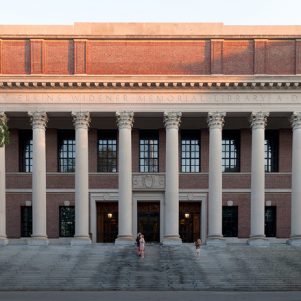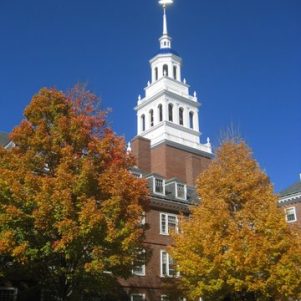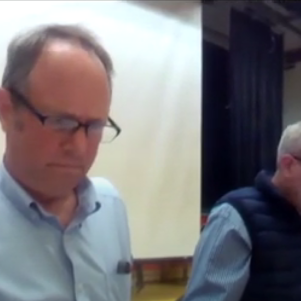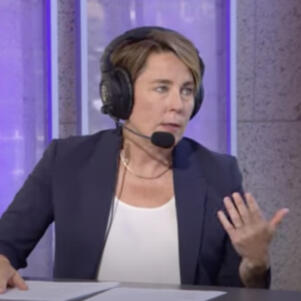Where Is Father Martin’s Bridge Leading To?
By Kevin Thomas | October 4, 2017, 14:36 EDT
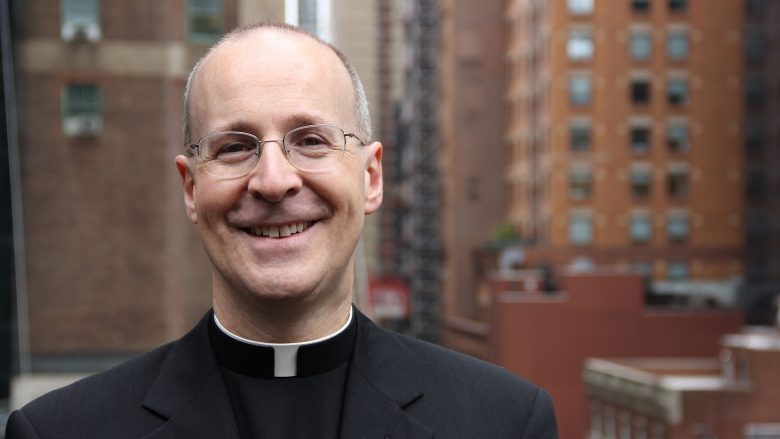 Father James Martin, S.J. ////
By Kerry Weber – photosub 2015040610018739, CC BY-SA 4.0, https://commons.wikimedia.org/w/index.php?curid=39599625
Father James Martin, S.J. ////
By Kerry Weber – photosub 2015040610018739, CC BY-SA 4.0, https://commons.wikimedia.org/w/index.php?curid=39599625 One day, Paul Darrow was sitting on his couch, mocking the odd-looking nun on television. But he soon found himself joining the Catholic Church. And, despite being gay, Darrow decided to follow the teachings of the Church. That decision cost him. “People were in shock … I lost clients, I lost friends,” Darrow said in a story published last year.
Paul Darrow is not mentioned in Father James Martin’s new book, Building a Bridge: How the Catholic Church and the LGBT Community Can Enter Into a Relationship of Respect, Compassion, and Sensitivity.
Darrow is included in the film Desire of the Everlasting Hills, a documentary about being gay and Catholic. You won’t find mention of it in the book.
The film was produced by Courage International, a ministry of the Church that reaches out to gays.
Is that ministry mentioned in Father Martin’s book? No.
There are other sources that help explain the Church’s teaching on gays – another documentary called The Third Way; the insightful and often humorous writings of Eve Tushnet; and an insightful, honest series of blogs on Spiritual Friendship.
You will not discover any of them in Father Martin’s book.
So, just who is invited on the bridge?
Father Martin is often in the news and, most recently, the publicity surrounds his having invitations to speak withdrawn because of controversy that he attracts. Those withdrawals have been criticized, including in this space, by both his supporters and critics.
Father Martin, the former editor of America, can be a good teacher – his book, The Jesuit Guide to (Almost) Everything proved helpful when I taught at a Jesuit high school.
His latest book, Building a Bridge, naturally brings controversy because it concerns the Catholic Church and the gays. In reactions to the book, several use their favorite H-words.
Heretic?
Homophobic?
Hater?
If you don’t mind, I’ll skip the name-calling and simply read the book.
Father Martin quotes often from a paragraph (2358) in the Catechism of the Catholic Church:
“[Homosexuals] must be accepted with respect, compassion and sensitivity. Every sign of unjust discrimination in their regard must be avoided …”
Who can argue with that? Everyone must be treated with respect, compassion and sensitivity, and the Church can do a better job with gays.
The second half of Father Martin’s book contains Biblical passages. His reflections were helpful, although I did not buy into all of them. But that wasn’t the point. Father Martin’s approach with the passages was pastoral, not as doctrine.
It’s the first half of the book that presents problems.
For one, he constantly states we must not judge, but then he offers a judgment of certain bishops.
Two, while he quotes from the Catechism, he intentionally leaves out other parts. (We used to call that being a “Cafeteria Catholic.” It is not a compliment.)
Three: Father Martin, for also his pastoral work, falls short as a teacher because of what he won’t say.
Four: As alluded to before, he leaves out the voices of gay Catholics who want to follow Church teaching.
As for the first charge, Father Martin said this book evolved from many bishops’ reaction to the horrific night in Orlando, Florida, when an ISIS-indoctrinated gunman killed 49 people in a gay nightclub in 2016. Bishops across the nation, along with other religious leaders, offered prayers in wake of the tragedy.
But Father Martin called out most of those bishops for not specifically using the terms “gay” or “LGBT.”
“To me, it seemed a failure of compassion,” Father Martin wrote.
Because bishops, or anyone else, do not use the words Father Martin wants them to use, he is not justified in saying they lack compassion. That’s a serious judgment I’ll defer to a higher authority.
In the Catechism, Martin quotes from section 2358, but does not touch 2359, which reads:
“Homosexual persons are called to chastity … [By] friendship, by prayer and sacramental grace, they can and should gradually and resolutely approach Christian perfection.”
Then there is the start of 2360: “Sexuality is ordered to the conjugal love of man and woman.”
Father Martin said he intentionally left out these parts because gays already know about them and most don’t accept them: “The LGBT community’s stance on these teachings is also clear. Same-sex relations are part and parcel of their lives.”
Because someone does not want to follow teachings, are we supposed to ignore the teachings? Shouldn’t a teacher clarify the meaning, explain the reasoning for the belief?
Father Martin writes, “LGBT Catholics are called to listen, consider, pray, and of course use their informed conscience as they discern how to live their lives.”
He is correct. Catholics are called to use their informed conscience. But if the teacher (or priest) won’t clarify the teaching, how can we be informed?
By leaving out the teaching, it weakens Father Martin’s voice.
That is why other voices are more honest and insightful. Tushnet’s book, Gay and Catholic: Accepting My Sexuality, Finding Community, Living My Faith, is an excellent read. She also wrote a review of Father Martin’s book for The Washington Post.
“Gay people who accept celibacy out of obedience in our churches face challenges to all Christian disciples. We also face the all-too-common LGBT experiences of violence, discrimination and isolation. And we have the unique experience of trying to serve and love in churches that often seem embarrassed by our existence and silent about our futures. I’d love a book about the gifts LGBT people can bring to our churches, and the compassionate and creative guidance we need from those churches.
“(The) new book by the Rev. James Martin … is not the book I’ve longed for.
“Martin never hints that gay people exist that seek to live in obedience to the Catholic Church … we may be able to offer insights into areas this book carefully avoids.
“The Catholic sexual ethic is this book’s embarrassing secret. It’s never mentioned, and so the difficulties the teaching itself poses for gay Catholics in our culture is never addressed.”
You should read the whole review.
Other links to click include stories about Tushnet and Darrow, the documentaries Everlasting Hills and The Third Way, and the blogs on Spiritual Friendship.
They all give an authentic voice, building a real bridge.
Kevin Thomas is a writer and former teacher living with his wife and children in Standish, Maine.

